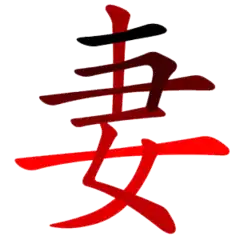妻
| ||||||||
Translingual
| Stroke order | |||
|---|---|---|---|
 | |||
Han character
妻 (Kangxi radical 38, 女+5, 8 strokes, cangjie input 十中女 (JLV), four-corner 50404, composition ⿱⿻一肀女)
References
- KangXi: page 257, character 30
- Dai Kanwa Jiten: character 6140
- Dae Jaweon: page 522, character 25
- Hanyu Da Zidian (first edition): volume 2, page 1036, character 2
- Unihan data for U+59BB
Chinese
| trad. | 妻 | |
|---|---|---|
| simp. # | 妻 | |
Glyph origin
| Historical forms of the character 妻 | ||
|---|---|---|
| Western Zhou | Shuowen Jiezi (compiled in Han) | Liushutong (compiled in Ming) |
| Bronze inscriptions | Small seal script | Transcribed ancient scripts |
 |
 |
 |
Ideogrammic compound (會意) : 肀 (“hand grabbing hair”) + 女 (“woman”) ― a man grabbing a woman's hair to show ownership (marriage by capture).
Etymology
Thought to be cognate to 齊 (OC *dzêi, “same, equal (adj.), in line”) (SWJZ; Karlgren, 1956) & interpreted as "an equal to her husband"; yet this is unlikely considering the realities of ancient societies (Schuessler, 2007).
Schuessler instead proposes Austroasiatic etymology: he reconstructs 妻 (OC *tshə̂i) < *k-sə̂i and compares it to Middle Khmer [script needed] (kansai, “wife”) (whence Khmer កន្សៃ (kɑnsay, “wife”)) and Khmer [script needed] (*khsay, “be female”) with *ka(n)- being a female marker (ibid.).
Pronunciation 1
Synonyms
Compounds
|
Pronunciation 2
Definitions
妻
- † to give a wife to; to give as a wife; to become married to a man
- 子謂公冶長,「可妻也。雖在縲絏之中,非其罪也」。以其子妻之。 [Classical Chinese, trad.]
- From: The Analects of Confucius, c. 475 – 221 BCE
- Zǐ wèi Gōngyě Cháng, “kě qì yě. Suī zài léiyì zhī zhōng, fēi qí zuì yě”. Yǐ qí zǐ qì zhī. [Pinyin]
- The Master said of Gongye Chang that he might be wived; although he was put in bonds, he had not been guilty of any crime. Accordingly, he gave him his own daughter to wife.
子谓公冶长,“可妻也。虽在缧绁之中,非其罪也”。以其子妻之。 [Classical Chinese, simp.]
- † to marry a woman
- 好色,人之所欲,妻帝之二女,而不足以解憂; [Classical Chinese, trad.]
- From: Mencius, c. 4th century BCE
- hǎosè, rén zhī suǒyù, qī dì zhī èrnǚ, ér bùzú yǐ jiěyōu; [Pinyin]
- To lust after feminine beauty is men's desire, and Shun married as wives Emperor Yao's two daughters, yet that was not enough to rid Shun of Shun's sorrow.
好色,人之所欲,妻帝之二女,而不足以解忧; [Classical Chinese, simp.]
Japanese
Etymology 1
| Kanji in this term |
|---|
| 妻 |
| つま Grade: 5 |
| kun’yomi |
From 端 (tsuma, “side, edge”), indicating the person who is at the side of someone: a spouse.[1] Compare the English expression better half.
This term originally referred to either a male (husband) or female (wife) spouse. In modern usage, this term refers only to a female spouse.[1]
Alternative forms
- 夫 (archaic)
Noun
妻 • (tsuma)
- (archaic) a spouse
- (humble, only refers to one's own) a wife (married woman)
- 1999 February 15 [Jun 20 1983], Tezuka, Osamu, “第8話 未知への挑戦 [Chapter 8: Challenge of the Third Kind]”, in ブラック・ジャック [Black Jack], volume 18 (fiction), 8th edition, Tokyo: Kodansha, →ISBN, page 176:
- 先生………………私の妻は美しいでしょう?
- Sensei……………… watashi no tsuma wa utsukushii deshō?
- Doctor... Do you think my wife is beautiful?
- Ā! Subarashii bijin desu yo!
- Sure! She’s a gorgeous lady!
- 先生………………私の妻は美しいでしょう?
-
Synonyms
Etymology 3
| Kanji in this term |
|---|
| 妻 |
| さい Grade: 5 |
| goon |
From Middle Chinese 妻 (MC t͡sʰei, t͡sʰeiH, “wife”).
Noun
妻 • (sai)
- my wife
- Isikawa Takuboku, Romazi Nikki
- Yo wa Sai wo aisiteru; aisiteru kara koso kono Nikki wo yomase taku nai no da.
- I love my Wife; it is precisely because I love her that I do not want her to read this Diary.
- Isikawa Takuboku, Romazi Nikki
Usage notes
- Used chiefly in written texts such as letters.
References
- 1988, 国語大辞典(新装版) (Kokugo Dai Jiten, Revised Edition) (in Japanese), Tōkyō: Shogakukan
- 2006, 大辞林 (Daijirin), Third Edition (in Japanese), Tōkyō: Sanseidō, →ISBN
Korean
Etymology
From Middle Chinese 妻 (MC t͡sʰei).
| Historical Readings | ||
|---|---|---|
| Dongguk Jeongun Reading | ||
| Dongguk Jeongun, 1448 | 촁 (Yale: chyèy) | |
| Middle Korean | ||
| Text | Eumhun | |
| Gloss (hun) | Reading | |
| Hunmong Jahoe, 1527 | 겨〯집 (Yale: kyěcìp) | 쳐 (Yale: chyè) |
Pronunciation
- (SK Standard/Seoul) IPA(key): [t͡ɕʰʌ̹]
- Phonetic hangul: [처]